-

新人教版高中英语必修3Unit 4 Space Exploration-Reading For Writing教学设计一
另一方面,其余的人反对这个计划,因为它可能会导致一些不好的影响。7.I hold the belief that space exploration not only enable us to understand how the universe began but also help us survived well into the future.我坚信探索太空不仅能够使我们了解宇宙的起源而且能够帮助我们更好地走进未来。8.I think we should spend more time and money exploring space so as to provide new and better solutions to people's shortterm and longterm problems.为了给人类的短期和长期问题提供更新和更好的解决方法,我认为我们应该花更多的时间和金钱来探索太空。9.From my point of view,it is wrong of young people to depend on their telephones too much,which may do harm to both their physical and mental health.在我看来,年轻人过度依赖手机是不对的,因为它们可能会对他们的身心健康都有害。最近你班同学就“人类是否应该进行宇宙探索”这个问题进行了激烈的讨论。有人认为,探索宇宙不仅让人类更好地了解宇宙的发展,还可以用来指导农业生产,以及把一些探索太空的高新技术用于现实生活;也有一些人认为探索太空花掉了大量的人力物力;影响了人们的生活水平。请你根据以下情况写一篇报告并发表自己的观点。注意:1.写作内容应包括以上全部要点,可适当发挥,使上下文连贯;

新人教版高中英语必修3Unit 5 The Value of Money- Discovering Useful Structure教学设计
Step 3 Meaning1. 过去将来时表示从过去某一时间来看将要发生的动作或存在的状态, 常用在宾语从句中。一般由“would/should +动词原形”构成。She hoped that they would meet again someday. 她希望将来有一天他们能再见面。2. was/were going to+动词原形: 表示过去将要发生或很有可能发生的动作, 常用于口语中, 表示预言、意图或者打算等。He was going to start work the following week. 他打算下星期开始工作。3. was/were about to do: 常用来表示即将发生的动作, “刚要/正要做……”。注意该结构不与任何时间状语连用。I felt that something terrible was about to happen. 我感到某种可怕的事情即将发生。4.was/were to do: 表示“曾计划做某事”, 如果表示“本来计划做某事, 动作没实现”, 则需用 “was/were to have done”。She said she was to have told me about the accident. 她说她本来想告诉我关于事故的事。5.Start, go, come, leave, see, meet等动词的过去进行时: 表示就过去某一时刻而言即将发生的动作。She was coming later. 她随后就来。I had just put on my overcoat and was leaving to visit a friend of mine. 我刚穿上外套要去看我的一个朋友。

新人教版高中英语必修3Unit 5 The Value of Money-Listening &Speaking&Talking教学设计
4. A:We’d like to have someone to say a word at the beginning to welcome the group.B:↙Who?A:We thought that you or Dr.Johnson might do it.B用降调说Who,其意思是问,对方想让谁在开场时致欢迎词。Step 6 Pronunciation---Practice1. Listen to the short conversation and mark the intonation with ↗, ↙ or ↙, ↗. Then discuss with a partner what they intend to convey by using different intonation.Owner: You know what ?↗ It’s a million-pound bank note↙.Waiter 1: Really ?↗(question)Waiter 2: Really !↙(unbelievable and surprised)Waiter 3: Really ?!↙↗(first question then surprised)2. Listen to the conversations. Underline the parts that are stressed and mark the intonation. Then talk about the implied meanings of the responses with different intonations. Listen again and repeat.1) Henry: It’s a nice suit.Owner: Oh, it’s perfect!↙(The intonation means it is very suitable for Henry.)2) Henry: Well, that’s very kind of you.Owner: Kind, sir ?↗(what you said is not right) No, it’s kind of you. You must come whenever you want and have whatever you like. Just having you sit here is a great honour !!↙(welcome you to come again)3)Henry:Well, to be honest, I have none. Oliver:(happily) What luck!(excited) Brother↗, what luck!↙(It means “Didn’t you hear it?”)Henry: Well, it may seem lucky to you but not to me!↗(angry) If this is your idea of some kind of joke, I don’t think it’s very funny. Now if you’ll excuse me, I ought to be on my way.↙(If so, I would leave.)Roderick: Please don’t go↙...(hope Henry can wait for a moment)Part B Viewing and Talking---Describe people’s changing attitudes in a film clipStep 1 Before-listening---Tell the filmYou are going to watch part of the film The Million Pound Bank Note. Look at these photos and guess what happens in the film.

新人教版高中英语必修3Unit 5 The Value of Money-Listening &Speaking教学设计
Step 4: Listen again and decide if the following statements are true (T) or false (F).1 It was the first time Chen Liyan's story was reported. T口 F口2 Chen found 10,000 yuan in a small plastic bag in Taiyuan railway station口 F口3 Wang Zheng apologized to Chen because he couldn't offer her more money. T口 F口4 Chen took out a large loan to cure her daughter, T口 F口5 Wang set up a fundraising website for Chen's daughter after Chen told him about her situation. T口 F口Step 5:After listening, discuss the questions.1 What kind of person do you think Chen Liyan is?Chen Liyan is generous and honest because she returned a large sum of money to the owner.2 Did Chen return the money because she didn't need it?No. She returned the money because it was the right thing to do. Evidence for this is that she refused to accept the reward money because she felt that it had not been earned. 3 Is it common for people to do what Chen did?It depends on the culture. In some countries it is quite common to return money that has been found. In other countries, people believe "Finders are keepers!" 4 How did Wang Zheng feel about the return of his money?He must have been very happy and relieved to have gotten his money back. We know this because he thanked Chen repeatedly and even offered her a reward.5 Why did Ma Dongbao tell Wang about Chen's family?He must have had great sympathy for Chen and her daughter and wanted to help them.'We know this because he arranged help for them. 6 How did the news reporter feel about Chen's actions?The news reporter felt that it showed that money wasn't the most important thing in life. We know this because the reporter told us that this is what Chen believes. and then said, “that's a great attitude to take."

新人教版高中英语必修3Unit 5 The value of money-Reading and Thinking教学设计二
? Could you offer me some kind of work here?? I don’t want your charity, I just want an honest job.? Careless: I landed in Britain by accident.Step 7:Consolidation.? Find Henry? Roderick and Oliver were I .making a bet when they saw Henry, a poor young man. ? Know Henry? About a month ago, Henry was sailing and later he found himself carried out to sea by a strong wind. Fortunately, he 2.was spotted by a ship. And it was the ship that brought him to 3.England? Offer money to Henry ? Oliver and Roderick gave Henry a letter and told him that there was money in it. They 4.persuaded him to accept it, and made him 5.promise that it wouldn't be opened until 2 o'clock.Step 8:Language pointsa large amount of: a large quantity of; a great deal ofe.g. They bought a large amount of furniture before they moved their new house.make a bet: make an arrangement to risk money, etc. on an event of which the result is doubtful.e.g. We made a bet on the result of the match.permit sb to do something: allow somebody to do somethinge.g. My mother doesn’t permit me to ride in the street after it rained.by accident: as a result of chancee.g. I only found it by accident.stare at: look at somebody or something with the eyes wide open in a fixed gaze( in astonishment, wonder, fear, etc)to be honest: to tell you the truth; to be franke.g. To be honest, I don’t think we have a chance of winning.Step7 Homework:What do you think will happen to Henry? Will the bank-note help him or get him into trouble?

新人教版高中英语必修3Unit 5 The Value of Money-Reading and Thinking教学设计一
Everybody wants to get wealth.In today’s material world,making money or becoming wealthy symbolizes a person’s success and capability. Many people just make every effort, pay any price to attain greater wealth. With money,they can buy nice, large apartments in nice neighborhood. With money they can own luxurious cars. Wealth seems to bring all happiness in life.But is wealth the only road to happiness? Not really. There are many things in the world, which are beyond the means of money, such as friendship, love, health and knowledge. People are so preoccupied with struggling for money that they have no time or would not take the time to form or maintain friendship. What happiness can they feel living as lonely miserable creatures without love or friends in the world even if they accumulate tremendous wealth?In my opinion, people can’t do anything without money, but money is not everything. What money will bring you depends on your personal belief and goal in life. If you are kind enough to help others, especially the poor, money is a good thing to you. With it, you can do much more for the benefit of people and your country, and it will add to your own happiness. If you want money just for your own needs, you’ll never be satisfied or happy. In a word,you should have money spent for more people. Only then can money be the source of your happiness.Step 8 Homework4 students in a group, one acts Roderick, one Oliver, one servant and the fourth one acts Henry Adams, then listen to the tape, pay more attention to the difference between American English and British English in pronunciation, stress, tone.

新人教版高中英语必修3Unit 5 The Value of Money-Reading for Writing教学设计二
2. 您能看到, 我头发太长了。You can see that my hair is much too long.3. 无论什么时候, 只要您想回来就回来。Please come back whenever you want.4. 您仅有很少的头发要理! You only have too little hair to cut !5. 为您服务是我的荣幸!It is my honour to serve you!Step 9 Writing(Henry is walking down the street when he sees a sign for a place that cuts hair. He decides to have it cut. )H=Henry B=BarberH: Good afternoon, I’d like to have my hair cut, if I may. (The barber looks at Henry’s hair and continues cutting another man’s hair. ) Er, I’d really like a haircut. As you can see it’s much too long. B: (in a rude manner) Yes, I can see that. Indeed, I can. H: Fine, well, I’ll have a seat then. (He sits in one of the barber’s chairs. The barber turns to look at Henry. )B: It’s quite expensive here, you know! Are you sure you can afford it?H: Yes. I think so. (After his hair is cut, the barber tells Henry how much he must pay. Henry shows the barber the bank note. )B: Why Mr. . . (looks shocked)H: Adams. Henry Adams. I’m sorry. I don’t have any change. B: Please don’t worry! (wearing a big smile) Nothing to worry about! Nothing at all! Please come back whenever you want, even if you only have too little hair to cut! It will be my honour to serve you!Step 10 Pair workExchange drafts with a partner. Use this checklist to help your partner revise his/her draft.1. Are all the elements of a play included and in good order ?2. Do the character use suitable language ?3. Are the stage directions clear and useful ?4. Is the plot clear and exciting enough ?

新人教版高中英语必修3Unit 5 the value of money-Reading For Writing教学设计一
【参考范文】Narrator:(Henry is smiling as he leaves the restaurant. As he is walking down the street, he sees a sign for a place that cuts hair. He decides to get it cut. )H=Henry;B=Barber;R=rude manH:Good afternoon, I'd like to get a cut, if I may. (The barber looks at Henry's hair and continues cutting another man's hair. )Er, I'd really like a haircut. As you can see it's much too long. B:(in a rude manner) Yes, I can see that. Indeed, I can. H:Fine, well I'll have a seat then. (He sits in one of the barber's chairs. The barber turns to look at Henry. )B:It's quite expensive here, you know!Are you sure you can afford it?H:Yes. I think so. (In comes the rude man. )R:Hey you there. I need a haircut quickly. Can you do me straightaway?B:All right, then, get in the chair and I'll see what I can do. R:Thank you. (sits down in one of the barber's chairs)H:Excuse me, but I was here first. Aren't you going to do my hair first?B:This man's in a hurry. H:Well so am I!I insist that you cut my hair first. B:OK, but I'll have to be quick. This gentleman is waiting. H:Thank you. (They both become quiet. After his hair is cut, the barber tells Henry how much he must pay. Henry shows the barber the bank note. )B:Why, Mr . . . (looks shocked)H:Adams. Henry Adams. I'm sorry, I don't have any change. R:You're that Mr Adams! Well,I'm glad I waited or I might never have known it was you. B:Why, Mr Adams, please don't worry!(wearing a big smile) Nothing to worry about!Nothing at all!Please come back any time, even if you only need too little hairs cut!It will be my honour to serve you!

教学反思数学仿编应用题活动《小鬼当家》课件教案
目的:1、让幼儿学会仿编和解答4的加减应用题。2、在生活情景中能根据水果卡片自编4的加减应用题。准备:1、知识经验准备:请家长带 幼儿去买东西,使幼儿了解一个买与卖的过程。2、物质准备:准备各种水果卡片,人手4个替代物作钱。过程:一、以“帮农民伯伯摘果子”引入。“小朋友,果园里的水果都成熟了,农民伯伯想请你们帮他摘水果,你们愿意吗?”(愿意)二、游戏“摘水果”。师交代游戏玩法和规则。三、分类活动:分水果。1、引导幼儿将自己所摘的水果跟同伴之间进行交流。2、交代任务:将各种水果分别放在筐里。
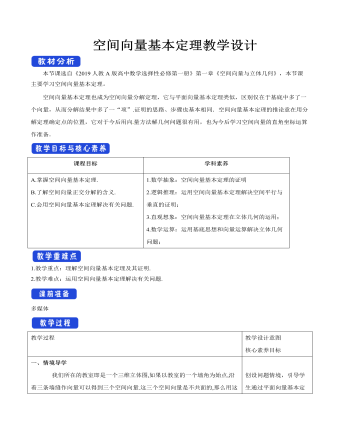
空间向量基本定理教学设计人教A版高中数学选择性必修第一册
反思感悟用基底表示空间向量的解题策略1.空间中,任一向量都可以用一个基底表示,且只要基底确定,则表示形式是唯一的.2.用基底表示空间向量时,一般要结合图形,运用向量加法、减法的平行四边形法则、三角形法则,以及数乘向量的运算法则,逐步向基向量过渡,直至全部用基向量表示.3.在空间几何体中选择基底时,通常选取公共起点最集中的向量或关系最明确的向量作为基底,例如,在正方体、长方体、平行六面体、四面体中,一般选用从同一顶点出发的三条棱所对应的向量作为基底.例2.在棱长为2的正方体ABCD-A1B1C1D1中,E,F分别是DD1,BD的中点,点G在棱CD上,且CG=1/3 CD(1)证明:EF⊥B1C;(2)求EF与C1G所成角的余弦值.思路分析选择一个空间基底,将(EF) ?,(B_1 C) ?,(C_1 G) ?用基向量表示.(1)证明(EF) ?·(B_1 C) ?=0即可;(2)求(EF) ?与(C_1 G) ?夹角的余弦值即可.(1)证明:设(DA) ?=i,(DC) ?=j,(DD_1 ) ?=k,则{i,j,k}构成空间的一个正交基底.

倾斜角与斜率教学设计人教A版高中数学选择性必修第一册
(2)l的倾斜角为90°,即l平行于y轴,所以m+1=2m,得m=1.延伸探究1 本例条件不变,试求直线l的倾斜角为锐角时实数m的取值范围.解:由题意知(m"-" 1"-" 1)/(m+1"-" 2m)>0,解得1<m<2.延伸探究2 若将本例中的“N(2m,1)”改为“N(3m,2m)”,其他条件不变,结果如何?解:(1)由题意知(m"-" 1"-" 2m)/(m+1"-" 3m)=1,解得m=2.(2)由题意知m+1=3m,解得m=1/2.直线斜率的计算方法(1)判断两点的横坐标是否相等,若相等,则直线的斜率不存在.(2)若两点的横坐标不相等,则可以用斜率公式k=(y_2 "-" y_1)/(x_2 "-" x_1 )(其中x1≠x2)进行计算.金题典例 光线从点A(2,1)射到y轴上的点Q,经y轴反射后过点B(4,3),试求点Q的坐标及入射光线的斜率.解:(方法1)设Q(0,y),则由题意得kQA=-kQB.∵kQA=(1"-" y)/2,kQB=(3"-" y)/4,∴(1"-" y)/2=-(3"-" y)/4.解得y=5/3,即点Q的坐标为 0,5/3 ,∴k入=kQA=(1"-" y)/2=-1/3.(方法2)设Q(0,y),如图,点B(4,3)关于y轴的对称点为B'(-4,3), kAB'=(1"-" 3)/(2+4)=-1/3,由题意得,A、Q、B'三点共线.从而入射光线的斜率为kAQ=kAB'=-1/3.所以,有(1"-" y)/2=(1"-" 3)/(2+4),解得y=5/3,点Q的坐标为(0,5/3).
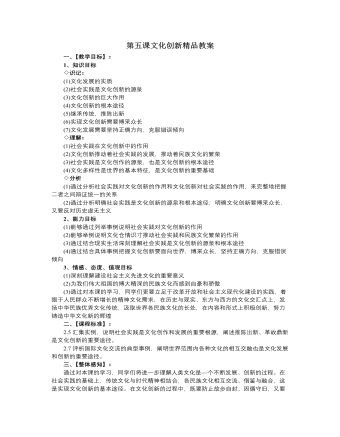
人教版高中政治必修3第五课文化创新精品教案
3.社会实践对文化创新的决定作用社会实践对文化创新具有两个方面的重要作用:(1)社会实践是文化创新的源泉实践,作为人们改造客观世界的活动,是一种有目的、有意识的社会性活动。人类在改造自然和社会的实践中,创造出自己特有的文化。离开了社会实践;文化就会成为无源之水、无本之木,人们不可能从事任何有价值的文化创造。◇本课小结:1.关于本课逻辑结构的宏观把握:文化创新的源泉和作用这一问题,教材分三个层次展开论证:一是不尽的源泉,不竭的动力;二是巨大的作用,深刻的意义;三是呼唤文化创新的时代。教材运用辩证方法从文化创新的源泉和作用展开论述。即社会实践是文化创新的源泉,文化创新又推动社会实践的发展和促进民族文化的繁荣。教材关于文化创新的途径问题,从三个层次展开讲述:第一个层次是“继承传统,推陈出新”;第二个层次是“面向世界,博采众长”;第三个层次是“坚持正确方向,克服错误倾向”。

新人教版高中英语必修3Unit 5 The Value of Money-Discovering Useful Structures导学案
4.They were going to find someone to take part in their bet when they saw Henry walking on the street outside.[归纳]1.过去将来时的基本构成和用法过去将来时由“would+动词原形”构成,主要表示从过去某一时间来看将要发生的动作(尤其用于宾语从句中),还可以表示过去的动作习惯或倾向。Jeff knew he would be tired the next day.He promised that he would not open the letter until 2 o'clock.She said that she wouldn't do that again.2.表示过去将来时的其他表达法(1)was/were going to+动词原形:该结构有两个主要用法,一是表示过去的打算,二是表示在过去看来有迹象表明将要发生某事。I thought it was going to rain.(2)was/were to+动词原形:主要表示过去按计划或安排要做的事情。She said she was to get married next month.(3)was/were about to+动词原形:表示在过去看来即将要发生的动作,由于本身已含有“即将”的意味,所以不再与表示具体的将来时间状语连用。I was about to go to bed when the phone rang.(4)was/were+现在分词:表示在过去看来即将发生的动作,通常可用于该结构中的动词是come,go,leave,arrive,begin,start,stop,close,open,die,join,borrow,buy等瞬间动词。Jack said he was leaving tomorrow.
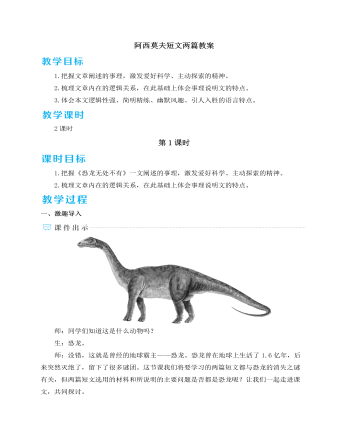
人教部编版语文八年级下册阿西莫夫短文两篇教案
预设 示例1:“板块背上驮着许多大陆,当板块向一个或另一个方向运动时,大陆也随之一起运动。”“驮”字形象地写出了大陆漂移的样子,使抽象的理论变得生动、有趣、易懂。示例2:“位于南极中心部位的南极洲是全球的大冰箱。”运用了打比方的说明方法,形象地说明了南极洲寒冷的程度和南极洲在地球生态环境中的重要位置。 示例3:“一立方英寸被压扁的沙子比一立方英寸普通的沙子要重得多。”运用作比较的说明方法,说明同体积被压扁的沙子比普通沙子重得多的特点。【设计意图】本环节设计的三个层次的语言赏析,让学生深入文本体会、学习语言简明精练、逻辑性强、幽默风趣的特点,提高学生的语言鉴赏能力,为今后的说明文写作夯实基础。四、总结拓展,激发思维所选的两篇课文就同一对象——恐龙从不同角度思考,从而发现新的论据或得出新的结论。文章给了我们一些有益的启示:不同领域的科学发现可以互相启发,从而有新的发现;要学会从不同角度思考问题。选择下面两个探讨任务之一课外完成。

人教版高中数学选修3分类加法计数原理与分步乘法计数原理(1)教学设计
问题1. 用一个大写的英文字母或一个阿拉伯数字给教室里的一个座位编号,总共能编出多少种不同的号码?因为英文字母共有26个,阿拉伯数字共有10个,所以总共可以编出26+10=36种不同的号码.问题2.你能说说这个问题的特征吗?上述计数过程的基本环节是:(1)确定分类标准,根据问题条件分为字母号码和数字号码两类;(2)分别计算各类号码的个数;(3)各类号码的个数相加,得出所有号码的个数.你能举出一些生活中类似的例子吗?一般地,有如下分类加法计数原理:完成一件事,有两类办法. 在第1类办法中有m种不同的方法,在第2类方法中有n种不同的方法,则完成这件事共有:N= m+n种不同的方法.二、典例解析例1.在填写高考志愿时,一名高中毕业生了解到,A,B两所大学各有一些自己感兴趣的强项专业,如表,
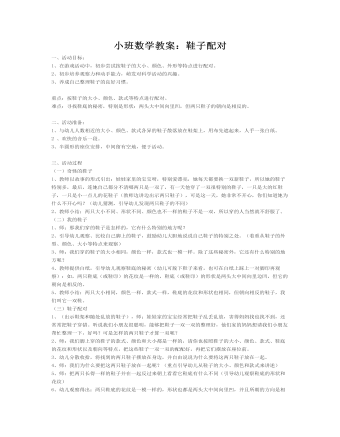
小班数学教案
2、初步培养观察力和动手能力,萌发对科学活动的兴趣。 3、养成自己整理鞋子的良好习惯。 重点:按鞋子的大小、颜色、款式等特点进行配对。 难点:寻找鞋底的秘密,特别是形状:两头大中间向里凹,但两只鞋子的朝向是相反的。 二、活动准备: 1、与幼儿人数相近的大小、颜色、款式各异的鞋子散落放在鞋架上,用布先遮起来,人手一张白纸。 2 、欢快的音乐一段。 3、半圆形的座位安排,中间留有空地,便于活动。 三、活动过程 (一)奇怪的鞋子 1、教师以故事的形式引出:娃娃家里的宝宝呀,特别爱漂亮,她每天都要换一双新鞋子,所以她的鞋子特别多,最后,连她自己都分不清哪两只是一双了,有一天他穿了一双很特别的鞋子,一只是大的红鞋子,一只是小一点儿的花鞋子(教师边讲边出示两只鞋子),可是这一天,她非常不开心,你们知道她为什么不开心吗?(幼儿猜测,引导幼儿发现两只鞋子的不同) 2、教师小结:两只大小不同、形状不同、颜色也不一样的鞋子不是一双,所以穿的人当然就不舒服了。 (二)我的鞋子 1、师:那我们穿的鞋子是怎样的,它有什么特别的地方呢? 2、引导幼儿观察、比较自己脚上的鞋子,鼓励幼儿大胆地说说自己鞋子的特别之处。(着重从鞋子的外型、颜色、大小等特点来观察) 3、师:我们穿的鞋子的大小相同,颜色一样,款式也一模一样。除了这些秘密外,它还有什么特别的地方呢?
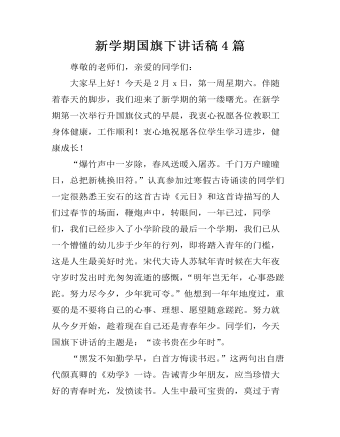
新学期国旗下讲话稿4篇
尊敬的老师们,亲爱的同学们:大家早上好!今天是2月x日,第一周星期六。伴随着春天的脚步,我们迎来了新学期的第一缕曙光。在新学期第一次举行升国旗仪式的早晨,我衷心祝愿各位教职工身体健康,工作顺利!衷心地祝愿各位学生学习进步,健康成长!“爆竹声中一岁除,春风送暖入屠苏。千门万户曈曈日,总把新桃换旧符。”认真参加过寒假古诗诵读的同学们一定很熟悉王安石的这首古诗《元日》和这首诗描写的人们过春节的场面,鞭炮声中,转眼间,一年已过,同学们,我们已经步入了小学阶段的最后一个学期,我们已从一个懵懂的幼儿步于少年的行列,即将踏入青年的门槛,这是人生最美好时光。宋代大诗人苏轼年青时候在大年夜守岁时发出时光匆匆流逝的感慨,“明年岂无年,心事恐蹉跎。努力尽今夕,少年犹可夸。”他想到一年年地度过,重要的是不要将自己的心事、理想、愿望随意蹉跎。努力就从今夕开始,趁着现在自己还是青春年少。同学们,今天国旗下讲话的主题是:“读书贵在少年时”。“黑发不知勤学早,白首方悔读书迟。”这两句出自唐代颜真卿的《劝学》一诗。告诫青少年朋友,应当珍惜大好的青春时光,发愤读书。人生中最可宝贵的,莫过于青少年时期。一个人的成功依赖于人在青少年时期的努力学习。
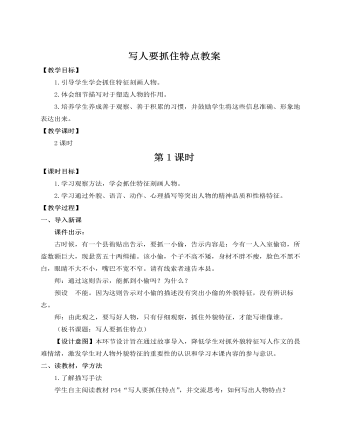
人教部编版七年级语文上册写人要抓住特点教案
【设计意图】本环节旨在引导学生明确如何围绕人物的精神品质和性格特点选择材料,刻画人物内在的个性特征。两个环节,从课内引申到课外实践,用思维导图的方式,直观易学。三、抓住细节,事中显神当我们写多件事情表现人物时,要处理好叙事的详略。详写的事情也不能面面俱到地展开叙述,而应该突出重点,要将概括叙述与具体叙述相结合,力求通过一些具体而微小的细节表现人物特点。1.例文引路,学习方法师:下面我们一起以魏巍的《我的老师》为例,学习多件事情叙述的详略安排,学习用细节刻画表现人物形象。(1)师印发并指导学生阅读魏巍的《我的老师》。(见《教师教学用书》P161第三单元写作的“例文评析”栏目)(2)明确阅读要求。课件出示:阅读要求①勾画出描写蔡老师的外貌、语言、动作、神态、心理等语句,体会语句表达的真挚感情。
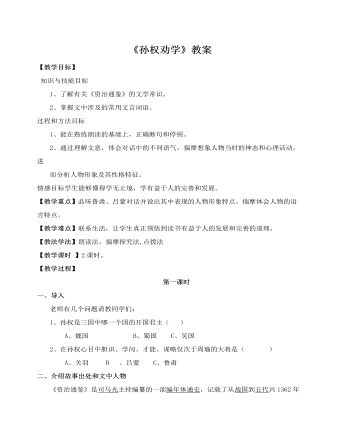
部编版语文七年级下册《孙权劝学》教案
二、介绍故事出处和文中人物《资治通鉴》是司马光主持编纂的一部编年体通史,记载了从战国到五代共1362年间的史事。司马光:字君实,陕州夏县人,北宋政治家、史学家。书名“资治”,说明本书编撰的目的是为封建统治阶级提供政治借鉴。孙权(182—252):字仲谋,吴郡富春人,三国时吴国的建立者。吕蒙:字子明,三国时吴国名将。三、朗读感知课文1、听朗读课文,注意人物对话的语气 (1)“卿今当涂掌事,不可不学!” 语重心长,谆谆告诫(2)“孤岂欲卿治经为博士邪!” (反问句,强调并不是要吕蒙研究儒家经典,当专掌经学传授的学官,而是有别的目的。)(3)“卿言多务,孰若孤?” 反问句,否定吕蒙辞以多务的理由。要重读强调(4)“卿今者才略,非复吴下阿蒙!” 感叹句,要显出惊讶不解的语气(5)“大兄何见事之晚乎!”反问句,指责中带有自豪的语气
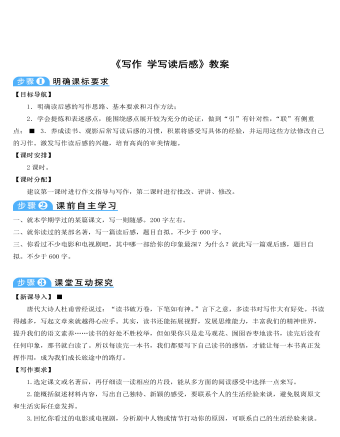
部编版语文八年级下册《写作:学写读后感》教案
【新课导入】唐代大诗人杜甫曾经说过:“读书破万卷,下笔如有神。”言下之意,多读书对写作大有好处。书读得越多,写起文章来就越得心应手。其实,读书还能拓展视野,发展思维能力,丰富我们的精神世界,提升我们的语文素养……读书的好处不胜枚举,但如果你只是走马观花、囫囵吞枣地读书,读完后没有任何印象,那书就白读了。所以每读完一本书,我们都要写下自己读书的感悟,才能让每一本书真正发挥作用,成为我们成长旅途中的路灯。【写作要求】1.选定课文或名著后,再仔细读一读相应的片段,能从多方面的阅读感受中选择一点来写。2.能概括叙述材料内容,写出自己独特、新颖的感受,要联系个人的生活经验来谈,避免脱离原文和生活实际任意发挥。3.回忆你看过的电影或电视剧,分析剧中人物或情节打动你的原因,可联系自己的生活经验来谈。【技法点拨】



